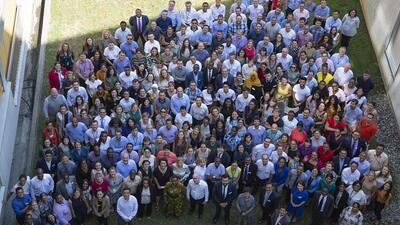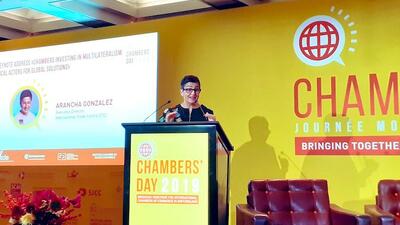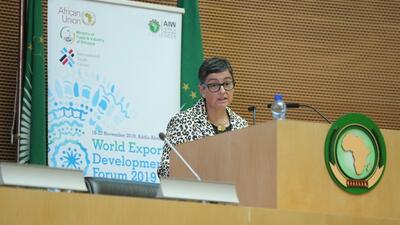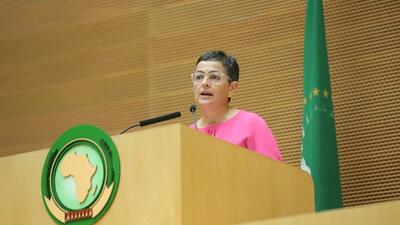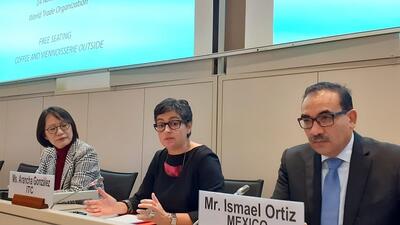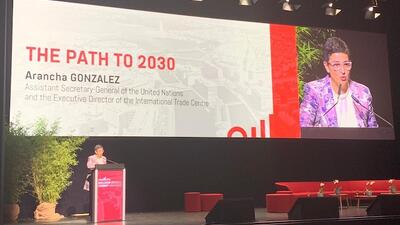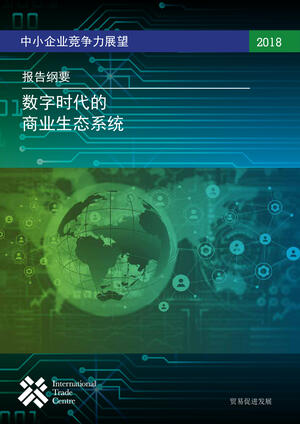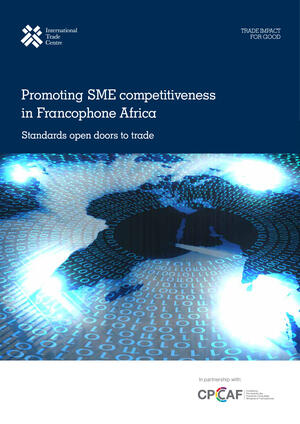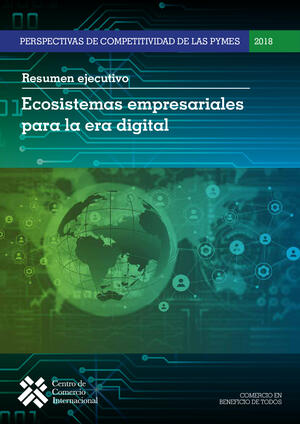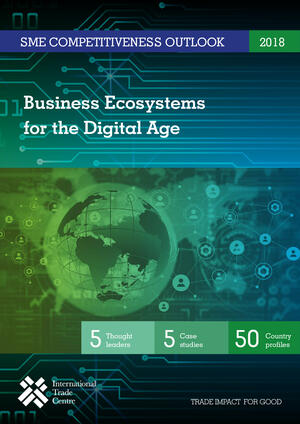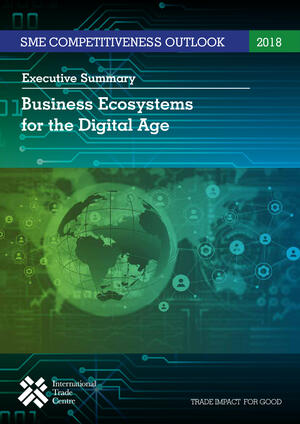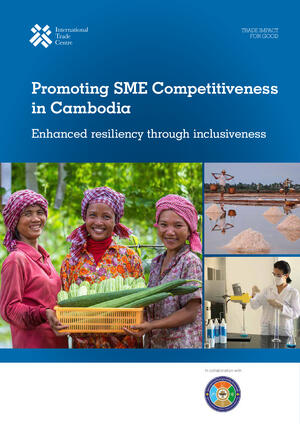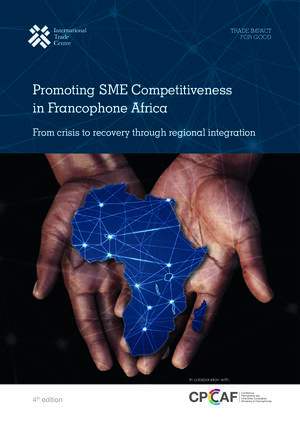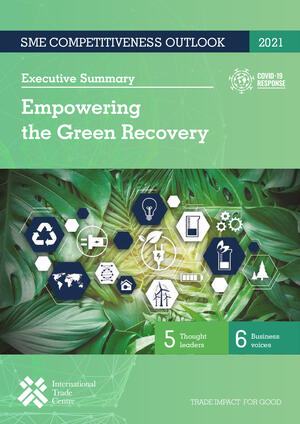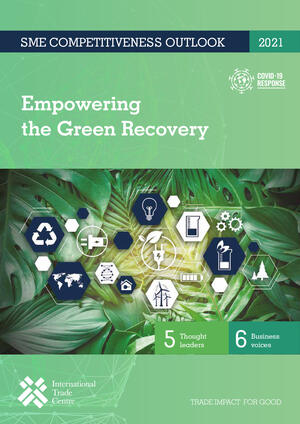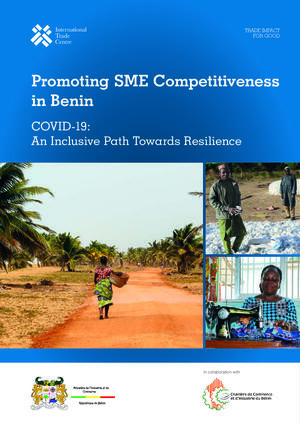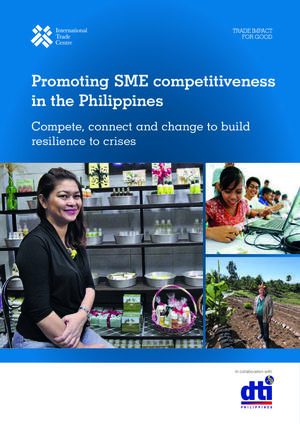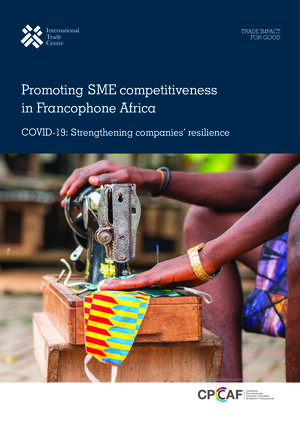Opening Remarks at SME Competitiveness Outlook 2018 Launch
Speech delivered by ITC Executive Director Arancha González at SME Competitiveness Outlook 2018 Launch: Business Ecosystems for the Digital Age, Geneva - Switzerland
Welcome and thanks to all of you for joining this discussion on ‘Business ecosystems for the digital age’, the theme of the fourth edition of ITC’s annual SME Competitiveness Outlook.
We know digitalization has changed our lives: the thought of losing our smartphones fills most of us with dread. Digitalization is also transforming the way companies do business. Economic and trade policy must grapple with the consequences of the digital revolution. The recent Statement of the G20 Trade and Investment Ministerial Meeting makes extensive reference to “the new industrial revolution”. Both the German and Argentine presidencies of the G20 held meetings on the digital economy at the ministerial level – though it took governments a moment to figure out which minister to send!
The current digital revolution is exceptionally fast. It may appear that we have always existed in a world of google and iPhones but the former is barely 20 and the latter just approached 12.
Every economic and technological revolution simultaneously empowers and disrupts. The sheer speed of change of the digital revolution leaves our economies vulnerable to economic, social, and political disruption. Indeed we are increasingly hearing the term ‘backlash against technology.’ Perceptions that technology is enriching a handful of powerful companies but disrupting the lives of the majority could add to today’s concerns over the distribution of the gains from trade.
The report we launch today argues that business ecosystems can play a crucial role in generating trust in new technologies and ensuring that businesses of all sizes are able to benefit from the digital era. The institutions that make up these business ecosystems – trade and investment promotion agencies, skills training institutions, and the like – are crucial for enabling small and medium-sized enterprises- SMEs- to increase their competitiveness and trade. But these institutions need to be agile if they are not going to get disrupted themselves.
New technologies offer new opportunities to connect buyers and suppliers across more locations and activities. For SMEs in particular, new technologies offer the prospect of cheaper access to market-relevant information and customers, new ways of obtaining finance, and faster avenues to build a reputation. In remote regions, new technology raises possibilities for more affordable transport and faster access to global markets.
Yet, not every SME is automatically able to take advantage of these new opportunities. Firms that cannot adjust will struggle in the digital age. In addition, the high levels of market concentration that have come with the platform economy can also make SMEs more vulnerable to abuses of market power by dominant players.
This report argues that effective business support ecosystems can tip the balance of advantages and pitfalls squarely into the positive column for SMEs. It points to four key roles where business ecosystems can help SMEs make the most of the digital economy:
The first is to make big data (typically owned by big firms) work for small firms.
Enabling potential exporters or investors to access tailored information on target markets is a prerequisite of successful SME trade promotion. Such information has traditionally been provided by Trade and Investment Support Institutions (TISIs).
Findings in this report suggest that targeting support makes these TISIsmore effective at supporting national exporters to enter and survive in targeted markets. Specifically, for a constant overall budget, a 10% increase in spending on new exporters leads to a 4.6% rise in the number of exporters per destination market.
In principle, big data makes it possible to provide such information at lower cost and higher quality. Yet digital giants may not necessarily make the data they control accessible for small firms. Through strategic partnerships, TISIs can help make big data work for small firms.
Now to the second point: fostering access to skills. The digital age will increasingly require complex problem solving and other emotional and technical skills. SMEs need to have access to technological skills specific to their field. Digitalization is likely to affect bakeries in a different ways than health spas or plumbers. Technical and vocational education and training institutions can work in partnership with the private sector to prepare future generations of workers for the digital economy. To do so, training and education institutions need to abandon their traditional resistance to change and instead anticipate, act and adjust. For instance, they could involve “gazelles”, young growing enterprises in cutting-edge sectors, in curriculum design and roll-out. This is somewhat risky, but there is no time for perfect solutions. Empowering people with skills builds trust in the future.
The third point deals with the regulatory side of fostering trust in the digital economy. For markets to function well, they need quality control and monitoring mechanisms. Starting with the rise of mass industrial production, countries have set up elaborate institutions – standard-setting and certification bodies, testing facilities, and the like – to ensure product safety and facilitate commerce.
Many of the new products and processes emerging from the digital economy contain quality aspects that are not immediately obvious to SMEs or even to consumers. Are the customer comments on hospitality webpages authentic, or manipulated? How secure are electronic banking tools? What is the likelihood that a self-driving car will crash?
The report sets out an agenda for adapting countries’ quality infrastructure for the digital age to ensure trust in digital goods, promote interoperability among them, and address privacy and security challenges.
Defining standards and regulations in the digital field might involve some trade-offs in terms of a compliance burden on business, but they would also create a more predictable – and more transparent – environment for innovation and competition. Once such standards are defined, transmitting knowledge about quality certification and related processes will be key to promoting certification. SMEs, especially in developing countries, may not be able to shoulder these costs fully. Evidence presented in this report shows that firms receiving support to obtain quality certification for merchandise are 7 times likelier than unsupported counterparts to end up getting certified, and 3 times more likely to start exporting.
This brings me to my final point. For SMEs everywhere to use digital technology effectively, they have to be connected to ICT and transport infrastructure. Yet around 1 billion people in low-income countries live more than 2 km from an all-weather road. About half of the world’s population – 3.9 billion people, 90% of them in the developing world – do not use the internet.
For Industry 4.0 to benefit everyone, these gaps need to be overcome. For many SMEs, the existence of high tech logistics hubs in urban areas is not enough. The last mile infrastructure connecting them to those hubs and beyond has to be built.
The challenges ahead are significant. The report in front of you does not provide all the answers, but hopefully provides concrete food for thought on where to start and how the different pieces are interlinked.
The report is full of practical examples of how business ecosystem players are tackling these challenges from Switzerland to Saint Lucia, from China to Morocco or Rwanda.
In these countries and elsewhere, courageous individuals and organisations have taken steps to make their economies ready for the digital age. They have recognized the value of data and technology, and have been willing to take risks and to forge new partnerships while working to maintain public trust. In the report, we refer to such individuals as “cautious revolutionaries.” I invite each and every one of you in the audience to become one.
I also invite you to learn more about the report in the presentation that will be given by ITC’s Chief Economist Marion Jansen and to listen to the insight provided by our distinguished panel that will be moderated by Jacqueline Coté.
Before doing so, however, it is my pleasure to invite Secretary-General Houlin Zhao to deliver some remarks around the role that ITU is playing in building the business ecosystems for the digital age.




